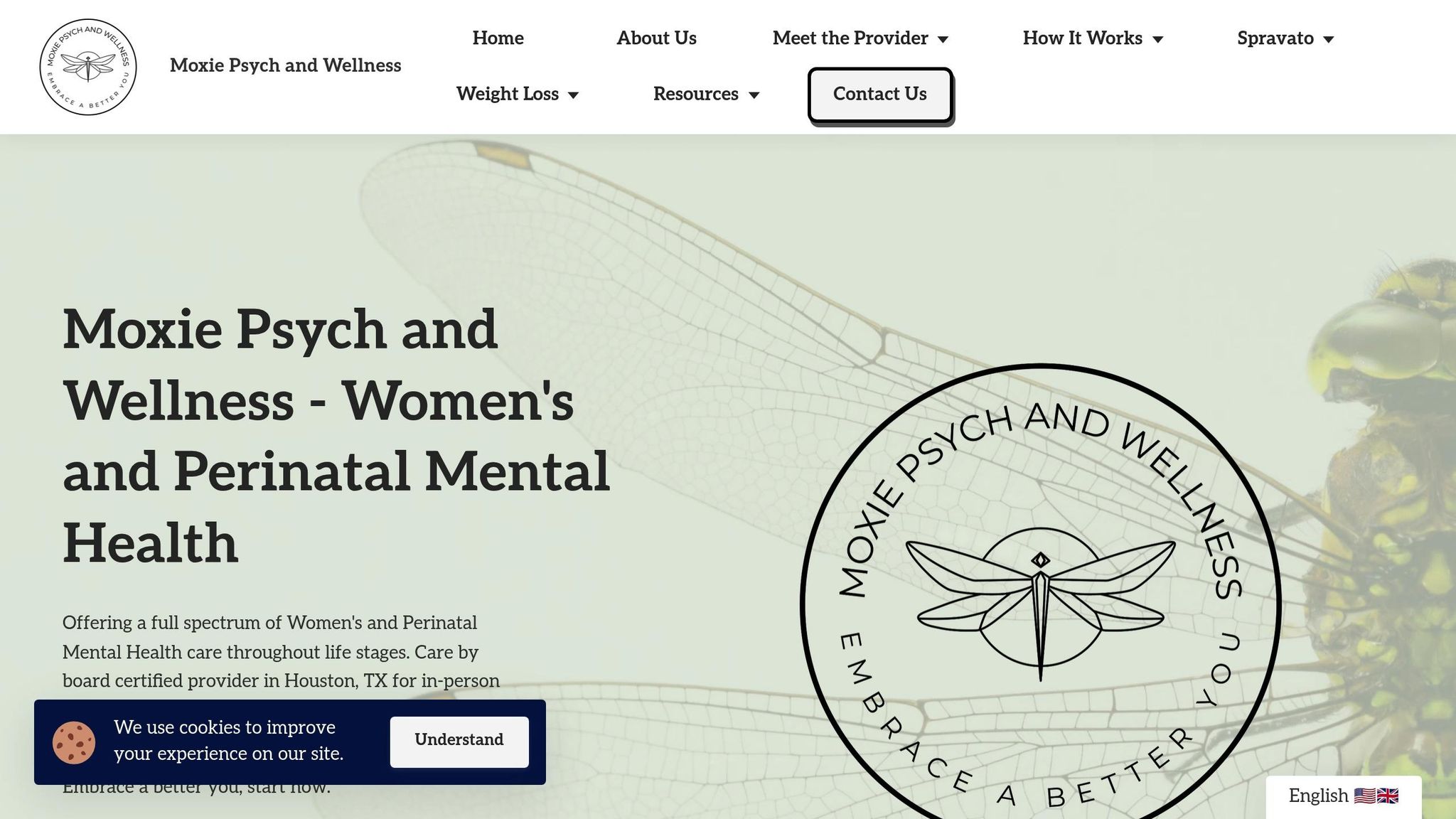Infertility impacts 1 in 8 couples in the U.S., with 6.1 million women of reproductive age facing challenges conceiving or maintaining a pregnancy. Beyond physical struggles, it brings emotional pain - grieving a child you’ve never met, facing societal pressures, and enduring a cycle of hope and disappointment. This invisible grief often leads to anxiety, depression, and identity struggles, comparable to the emotional toll of severe illnesses.
Coping involves practical steps like journaling, mindfulness, and setting boundaries to protect your mental health. Support groups and professional help can provide relief. Rebuilding your sense of self starts with rediscovering passions, setting new goals, and focusing on personal growth. Healing isn’t linear, but it’s possible to create a meaningful life by prioritizing well-being and surrounding yourself with supportive relationships.
416. Behind the Sessions: Grief and Identity When IVF Doesn't End with a Baby
How Infertility Changes Your Emotions and Identity
Infertility doesn’t just affect your mental health; it also deeply influences your emotions and how you see yourself. It can lead to profound changes in your self-perception and emotional well-being.
Common Emotional Reactions
The emotional toll of infertility often includes feelings of inadequacy, shame, and failure. These emotions are frequently amplified by societal pressures and expectations surrounding fertility and parenthood, which can leave you questioning your self-worth. Over time, these initial emotional responses can evolve into deeper struggles with identity.
Changes to Your Sense of Self
Facing infertility can challenge your sense of identity, leading to questions about your value as a potential parent and even as an individual[1]. This experience often sparks a period of self-reflection, prompting you to redefine what it means to feel complete and find new ways to connect with yourself.
Coping Methods and Recovery Strategies
Finding ways to manage the grief of infertility and rediscover your sense of self can make a world of difference during this challenging time.
Proven Coping Techniques
Journaling can be an incredibly helpful outlet for sorting through the complex emotions tied to infertility. By putting pen to paper, you can uncover patterns in your emotional responses and create a space for self-reflection. Dedicating just 10–15 minutes a day to this practice can help you better understand and process your feelings. Pairing journaling with mindfulness practices can provide even more stability in your daily routine.
Mindfulness practices - like breathing exercises, meditation, or body scans - are another way to manage the stress and anxiety that often accompany infertility. These techniques encourage you to observe your thoughts and feelings without judgment, giving you the ability to step back and create some distance from overwhelming emotions.
Support groups can be a lifeline, offering connection with people who truly understand what you're going through. These groups provide not only validation but also practical advice. Many find that sharing experiences with others on a similar path helps ease feelings of isolation and restores a sense of hope.
Creative expression - whether through art, music, or writing - offers a way to reconnect with parts of yourself that exist outside the realm of parenthood. This can be a time to explore new hobbies or rediscover old ones, helping you expand your identity beyond the challenges of infertility.
Protecting Your Mental Health with Boundaries
Establishing boundaries is essential for safeguarding your emotional health during this time. For instance, setting limits on social media can help you avoid triggering content like pregnancy announcements. Consider unfollowing or filtering accounts that bring you distress.
When it comes to family and social gatherings, it’s okay to protect yourself by skipping events like baby showers or children’s birthday parties if they feel too painful. If you do choose to attend, prepare responses for well-meaning but insensitive comments, such as "just relax and it will happen" or "have you tried...?" Simple, firm replies like "we’re working with our doctor on this" can help redirect the conversation.
Workplace boundaries are equally important. If needed, have a private conversation with your supervisor to discuss adjustments that might help you navigate treatments or emotional challenges.
By creating these boundaries, you can carve out the emotional space needed to focus on your personal growth and healing.
Building Strength and Personal Growth
Infertility can push you to uncover inner strengths you may not have realized you had. Prioritizing self-care is key - this includes regular exercise, getting enough sleep, eating well, and engaging in activities that bring you joy. Exploring new interests or revisiting old passions can also help you build an identity that isn’t solely defined by parenthood.
Resilience grows through daily practices like gratitude, celebrating small wins, and allowing yourself to experience and accept difficult emotions. While the journey is undoubtedly painful, many people find it reveals their capacity for growth and strength in ways they never expected.
Nurturing relationships is another cornerstone of healing. Spend time with friends and family who respect your boundaries and provide genuine support. On the flip side, it’s okay to step back from relationships that feel draining or unsupportive. Surrounding yourself with people who truly uplift you can make all the difference.
sbb-itb-3d00657
Getting Professional Mental Health Support
Sometimes, self-help strategies and support groups aren't enough to address the emotional weight of infertility-related grief. When these methods no longer provide relief, seeking professional mental health support can be a crucial step in healing and rediscovering your sense of self.
Signs You Need Professional Help
It’s not always easy to know when it’s time to ask for professional support, especially during emotionally overwhelming times. However, there are clear signs to watch for. If sadness lingers for weeks or months without easing, it might be time to seek help. Anxiety that interferes with your daily life, work, or social interactions - or even disrupts your fertility treatments - is another red flag. Changes in sleep patterns, appetite, or losing interest in activities you once loved are also indicators that grief may be taking a toll on your overall well-being.
In more critical situations, thoughts of self-harm or feeling that life has lost its meaning demand immediate professional attention. Despite the significant emotional challenges infertility can bring, research shows that fewer than 25% of distressed couples seek professional mental health care - a statistic that highlights the need for greater awareness and access to support.
Mental Health Services at Moxie Psych and Wellness

For those navigating the emotional complexities of infertility, Moxie Psych and Wellness offers specialized care tailored to women and perinatal mental health. Their expertise allows them to provide a deep understanding of the unique struggles associated with infertility. Whether you prefer in-person appointments or virtual sessions, they offer both options, making it easier to access care in a way that fits your needs and schedule.
Their services include medication management for individuals whose depression or anxiety symptoms have become too overwhelming to handle alone. Importantly, the providers are mindful of how medications may interact with fertility treatments, ensuring a balanced approach to care. For those facing treatment-resistant depression, Moxie also offers Spravato, designed for situations where traditional antidepressants have not been effective. Flexible scheduling, including virtual appointments, ensures support is available even during the unpredictable nature of fertility treatment cycles.
Why Personalized Treatment Plans Work
Infertility grief is deeply personal, and one-size-fits-all approaches to mental health often fall short. At Moxie, treatment plans are tailored to address your unique experiences with depression, anxiety, grief, and identity concerns. These plans go beyond symptom management, helping you navigate grief, resolve conflicts, restructure negative thoughts, and develop effective coping strategies. The goal isn’t just to support you through fertility treatments but to help you build emotional resilience, no matter where your journey leads.
Untreated mental health issues can have a direct impact on fertility treatment outcomes. They can make it harder to follow medical protocols, affect your physical health, and cloud your ability to make important decisions [2][3]. A personalized approach provides a safe space to process your emotions, grieve, and develop strategies to manage the ups and downs of the process. It’s about creating a foundation of emotional strength that supports your well-being, both now and in the future [3].
Building a New Identity and Moving Forward
Once you've explored ways to cope and sought professional support, the next step is focusing on creating a renewed sense of self. Grieving infertility can eventually open the door to rebuilding your identity - one that's rooted in strength and a deeper understanding of who you are. This isn't about going back to who you were before but about stepping forward into a more resilient version of yourself.
Developing a New Sense of Self
If your sense of self was closely tied to the idea of parenthood, it’s time to recognize that your value goes far beyond that. Take a moment to reconnect with the parts of yourself that existed before infertility became part of your journey.
Think about the things that once brought you happiness, purpose, or fulfillment. These can serve as the foundation for your next chapter. Along the way, consider the qualities you've gained through this experience - like resilience, empathy, and a deeper perspective on life. These traits are not just reminders of what you've endured but also valuable pieces of your evolving identity.
Seeking help from a professional can provide guidance as you navigate this process. As you redefine who you are, setting new goals can help spark a sense of hope and direction.
Discovering Purpose and Hope
Finding purpose doesn’t have to mean making sweeping changes. Sometimes, it’s about taking small, intentional steps that align with your values. For some, this might mean using their experience to support others in similar situations. For others, it could be rediscovering hobbies or passions that were set aside during fertility treatments. The important thing is to remain open to opportunities you may not have considered before.
Start with small, achievable goals and lean on a network of supportive people to help restore hope. Whether it’s pursuing a career milestone, diving into a creative project, traveling to new places, or focusing on personal growth, each accomplishment becomes a reminder of your ability to adapt and thrive. These moments build on the resilience you’ve already demonstrated.
Understanding Healing as a Process
Healing from infertility grief is not a straight path with a clear destination. Some days will feel like progress, while others may bring unexpected sadness. Understanding this ebb and flow can help you approach your journey with patience and kindness toward yourself.
Focus on small, everyday actions that contribute to your well-being - whether it’s sticking to healthy routines, practicing mindfulness, spending time with supportive people, or finding peace in activities that bring you joy.
Change becomes less overwhelming when you see it as an opportunity to grow rather than something to simply endure. While your life may not look like the one you once envisioned, it can still be filled with meaning, joy, and fulfillment. The strength and clarity you’ve gained through this process are worth honoring and celebrating.
FAQs
How can journaling and mindfulness help manage the emotional impact of infertility?
Journaling offers a private outlet to explore and express the emotions tied to infertility. It helps untangle complex feelings, bringing clarity and understanding. Over time, it can reveal recurring patterns in thoughts and emotions, encouraging greater self-awareness and emotional insight.
Mindfulness techniques, such as meditation and deep breathing, work to ease stress, anxiety, and overwhelm. They create space for calm and emotional resilience, making it easier to face the hurdles that come with infertility. Together, these practices support mental health by fostering self-reflection and promoting emotional steadiness during this challenging period.
What are the signs that you may need professional mental health support for infertility-related grief?
If you’re dealing with ongoing feelings of sadness, anxiety, or emotional detachment that make it hard to get through your day, it might be time to consider professional mental health support. Other warning signs can include overwhelming grief that doesn’t seem to ease, trouble managing responsibilities at work or home, or tension in your relationships.
Pulling away from others, feeling a sense of hopelessness, or having thoughts of self-harm are serious indicators that reaching out to a mental health professional is essential. Acting early can help you gain the tools and guidance to work through these emotions and begin to rediscover a sense of balance and well-being.
How can someone rebuild their sense of self and find new meaning after facing infertility?
Rebuilding your sense of self after facing infertility starts with recognizing and working through your emotions. Give yourself permission to grieve, and prioritize self-compassion and self-care to ease stress and support your healing process.
Rediscovering purpose might mean diving into activities that bring you happiness and a sense of accomplishment. Whether it’s picking up a hobby, volunteering, or focusing on personal development, these pursuits can help you redefine who you are and find fulfillment beyond the struggles of infertility.
If things feel overwhelming, consider seeking support from a mental health professional. Practices like Moxie Psych and Wellness focus on women's mental health and can provide tailored care to guide you through this challenging time.



